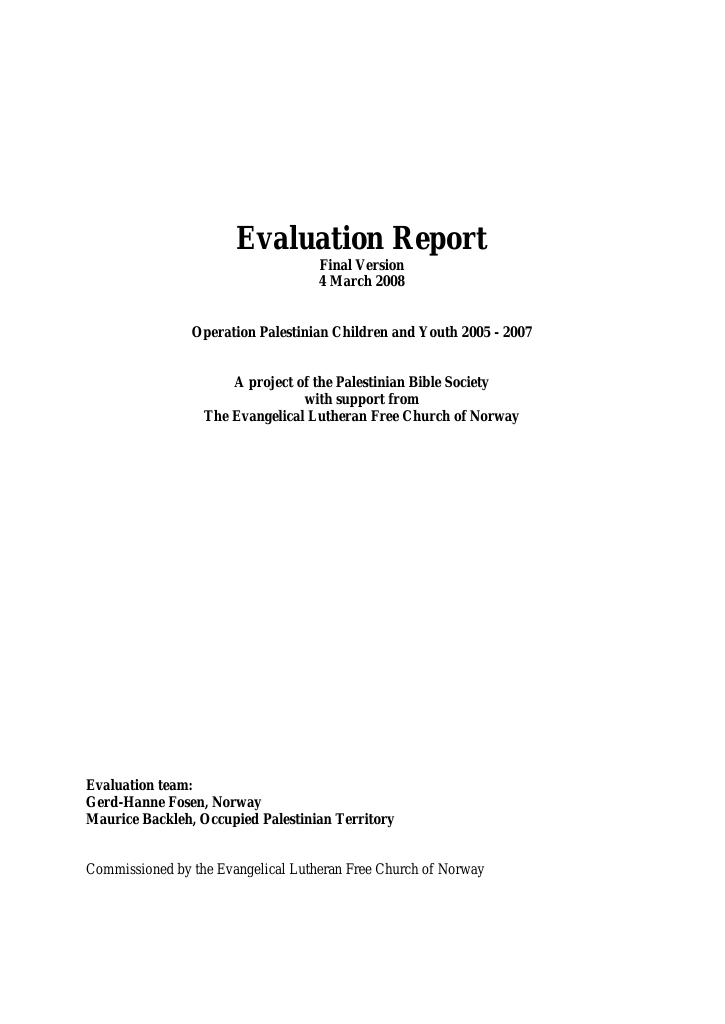Evaluering
Evaluation Report (Final Version, 4 March 2008) Operation Palestinian Children and Youth 2005 - 2007
Background: PBS started the pre-cursor to the project “Operation Palestinian Children and Youth” in response to the Second Intifada in September 2000 when PBS put together a Christmas program for children in Bethlehem. Due to overwhelming response and the continued negative impact of the Intifada, the one-time event was developed into an on-going program. Since the Intifada, the children in the West Bank and Gaza have been exposed to harassment, displacement, shooting and destruction of their homes and schools. The conflict has a severe impact on children’s possibilities to live a safe and healthy life, and many see their right to education, health or an adequate standard of living violated on a daily basis. OPCY is a project operated by PBS that provides small scale educational programs to children and youth on the West Bank and training of trainers working with children and youth. Through the programs offered in cooperation with the local communities, OPCY aims to raise awareness of the communities’ responsibility for children’s well-being, to bring joy in a situation marked by despair, to build bridges between Muslims and Christians and establish informal peace education in villages throughout the West Bank. One of the long-term goals of the project is to prepare the next generation to bridge gaps between Israelis and Palestinians. Since 2004 ELFCN has cooperated with PBS and provided financial support. Purpose/objective: • to describe and discuss the activities of OPCY and how PBS organizes the work to carry out the activities • to assess 1) the extent to which the project objectives have been reached, 2) the impact of the project, 3) whether the objectives are relevant, 4) whether the project and/or results of the project are sustainable, and 5) whether the project is cost-efficient • to give recommendations on a possible second phase of the program Methodology: 1) Full day meeting with staff 2) Field visits to various project sites where programs were observed 3) Interviews in focus groups and/or individually with various stakeholders; community leaders, teachers, volunteers, participants and some parents. 4) A questionnaire was filled out by all the OPCY staff members who were also interviewed individually. 5) Debriefing with staff Key findings: The long term goals and three-year objectives have remained largely unchanged throughout the project period, but annual expected results and activities have been adjusted to fit with reality as the project has developed. The ambitious target of reaching 50.000 children in 100 villages in three years has been adjusted to a more reasonable level of working with 40-50 communities. This reduction in number is also a result of realizing that in order for the project to have a lasting impact, it is necessary to work more closely with communities over time. According to the project document, the main target groups are children 6 – 12 and youth 13 – 17. Upon closer examination of the objectives, however, it appears that while children and youth might be the primary target group, working with the adults who again work with children/youth are equally important for reaching the OPCY-objective of helping the communities take responsibility for the well-being of children. In 2007 increased attention was given to training of trainers. OPCY has, over the past years, developed mutual trust and respect in many villages throughout the rural areas of the West Bank. Recommendations: a) Continue working directly with the children and youth in order to bring attitudes, skills and hopes for a better tomorrow where despair is threatening to take over. b) Increase efforts to train trainers and work with the adults in local communities - to ensure follow-up of the children, sustainability of both children’s and youth program, and possibility to reach the objective of raised awareness of the communities’ responsibility for the well-being of the children. c) Increase advocacy role through increased cooperation with curriculum developers, the MoE, teacher training colleges, head masters at schools, teacher’s unions, youth union and/or other relevant organizations to promote the interest of children/young people. d) Working more with families. e) Develop a strategy for the overall community development work of PBS and at the same time remain flexible. The organization is growing and needs a more coherent strategy. This must be balanced by the need to stay flexible to respond to emerging needs. f) Develop a clearer goal hierarchy with realistic ambitions for OPCY g) Establish a baseline against which results of next project period can be measured.
